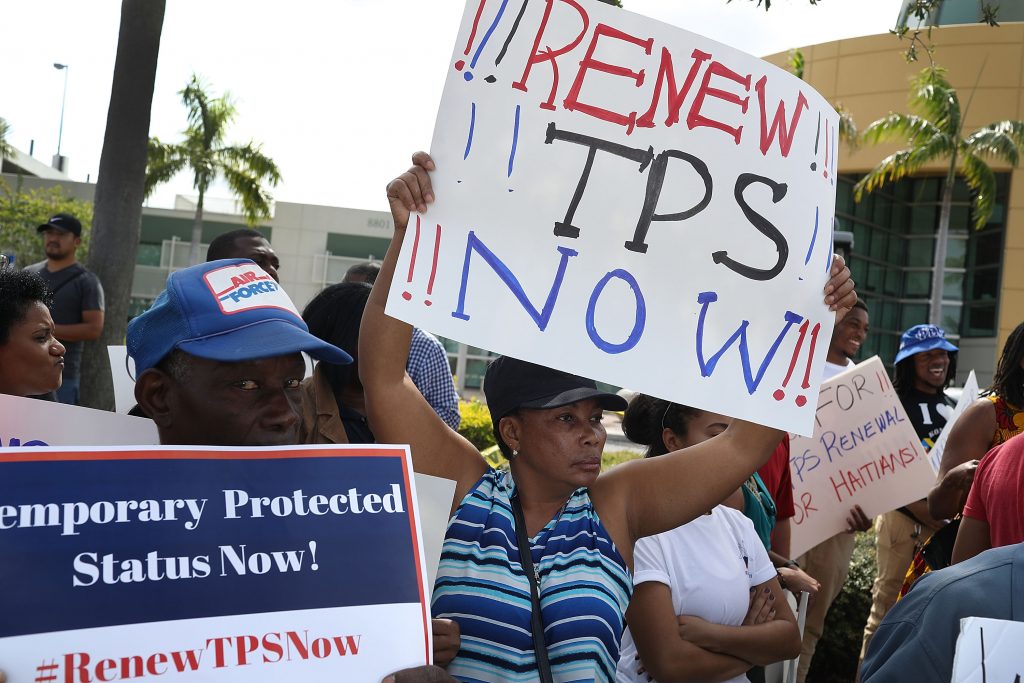While Temporary Protected Status has protected immigrants from deportation, the program does not provide a path to citizenship for recipients. As such, TPS holders have always known that their fates hung in the hands of the government. But since the inception of the program – which provided protection to immigrants already in the US who fled environmental disasters or political unrest in their countries – in 1990, TPS recipients have set roots and started anew in the US. But when the Trump Administration attempted to end TPS for some countries, he upended the lives of many. Since then, this community has fought back, and on Tuesday, February 12, it plans a march to put pressure on Congress and President Donald Trump.
Courts have helped keep TPS alive for people who migrated from Haiti, Sudan, El Salvador and Nicaragua between 1997 and 2010. In October, a federal judge restored the protection, calling the revocation racially motivated, and gave TPS holders permission to continue working in the US legally.
The case will likely head to the to the Supreme Court, and in the meantime, TPS holders and their allies have demanded permanent residence for immigrants with TPS status.
The National TPS Alliance officially endorsed the American Promise Act, headed by Rep. Nydia Velazquez, which ensures individuals from all 13 countries issued TPS are protected and provided with a pathway to citizenship.
As part of this push, TPS holders and their allies – many of whom are union workers – are leading a mobilization effort in Washington, DC, which will include the March for TPS Justice, rally, and lobbying of their cause before Congress.
“We are living in a time when I think no one has doubt that we have a president who is utilizing racism and divisiveness to meet his political objectives,” says José Palma, a TPS holder from El Salvador and spokesperson with National TPS Alliance. “What he’s doing to the undocumented community, to DACA (Deferred Action for Childhood Arrivals) students and TPS holders is an attack against our community because of our skin color and political force. We have to push for permanent protection because in doing so we are taking a stand for the entire community.”
Event coordinators have billed this as the largest attempt to stop Trump from cutting the program, which would affect the more than 400,000 TPS holders and their 275,000 US-born children. Immigration’s often framed as a Latino issue (though Afro-Latinxs are hardly ever the face of the movement), but our broken immigration system hurts immigrants from across the world. The end of TPS particularly puts Black immigrant communities, which simultaneously feels the affects of the US’ criminal justice system and immigration policies, at greater risk.
On top of potentially sending TPS holders back to countries still struggling with disaster, instability, and violence, Working Families United – a coalition of millions of US workers – officials argue that it’ll also have negative effects in the United States, including costing taxpayers more than $3 billion to deport TPS recipients.
But beyond that, it’s important the conversation around the program focus on individual stories. Wilna Destin, a member of UNITE HERE, is a TPS holder from Haiti. She arrived to the United States in 2000, because she felt she had no other option. Destin, who in 2018 legally challenged the Trump Administration for influencing the US Department of Homeland Security’s decision to cancel TSP, received the protection after unsuccessfully applying for asylum, and now the organizer’s livelihood and family’s future is in limbo as she awaits a final verdict.
Haiti is still too politically unstable for her to safely return, and her young children constantly worry about the ramifications of their mother’s deportation.
“I joined the lawsuit because there’s a lot of people who don’t have a voice. I’m the union leader and I’m their voice,” Destin says. “I’m a mother and I want to raise my kids and support them throughout their lives. I look forward to becoming a grandmother and babysitting their children.”
Working Families United officials are supporting the American Promise Act and SECURE Act (to provide a Syria strategy) and pushing for bill introductions within the first 100 days Congress is in session.
March for TPS Justice takes place on February 12 from 9 a.m. to noon ET in front of the White House. Learn more here.







